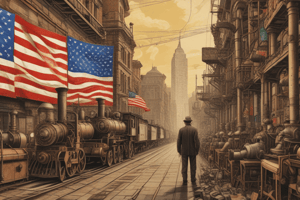Podcast
Questions and Answers
What is the difference between the 'commercialisation model' and the 'agrarian model' of the origins of capitalism?
What is the difference between the 'commercialisation model' and the 'agrarian model' of the origins of capitalism?
- The commercialisation model sees capitalism originating in English agrarianism, while the agrarian model explains the rise of capitalism by unique circumstances in trade and commerce.
- The commercialisation model sees capitalism originating in the 18th century, while the agrarian model explains the rise of capitalism by unique circumstances in the 21st century.
- The commercialisation model sees capitalism originating in trade and commerce, while the agrarian model explains the rise of capitalism by unique circumstances in English agrarianism. (correct)
- The commercialisation model sees capitalism originating in the 19th century, while the agrarian model explains the rise of capitalism by unique circumstances in the 16th century.
What was the Elizabethan System?
What was the Elizabethan System?
- The Elizabethan System was a system of feudalism that promoted the idea that government subsidies, monopolies, and protective tariffs were necessary to encourage home production of manufactured goods.
- The Elizabethan System was a system of mercantilism that paved the foundation for establishing a global empire in the 19th century. (correct)
- The Elizabethan System was a system of socialism that emphasized state power and overseas conquest as the primary aim of economic policy.
- The Elizabethan System was a system of laissez-faire capitalism that provided the moral foundations of a just society.
What is mercantilism?
What is mercantilism?
- Mercantilism was a system of laissez-faire capitalism that provided the moral foundations of a just society.
- Mercantilism was a system of feudalism that promoted the idea that government subsidies, monopolies, and protective tariffs were necessary to encourage home production of manufactured goods.
- Mercantilism was a system backed by state controls, subsidies, and monopolies, where merchants made profits from buying and selling goods, and the state regulated the economy. (correct)
- Mercantilism was a system of socialism that emphasized state power and overseas conquest as the primary aim of economic policy.
What is the current state of capitalism characterized by?
What is the current state of capitalism characterized by?
What is the Industrial Revolution?
What is the Industrial Revolution?
What is the main aim of economic policy according to proponents of mercantilism?
What is the main aim of economic policy according to proponents of mercantilism?
What is the impact of capitalism on minorities and women?
What is the impact of capitalism on minorities and women?
What is the IMF's warning regarding inequality within nations?
What is the IMF's warning regarding inequality within nations?
What is the role of Keynesian economics in government regulation?
What is the role of Keynesian economics in government regulation?
Flashcards
Mercantilism
Mercantilism
A system where merchants profit from trading goods, regulated by the state. It emphasized state power and overseas conquest as the main economic aim. It involved government subsidies, monopolies, and protective tariffs to encourage domestic production.
Bullionism
Bullionism
The idea that a nation should focus on accumulating gold and silver reserves, believing it was a measure of national wealth. It heavily influenced mercantilism and its policies.
Factory system
Factory system
The shift from hand-made goods to mass production in factories, involving a division of labor and routine tasks. This system laid the groundwork for industrial capitalism.
Industrial Capitalism
Industrial Capitalism
Signup and view all the flashcards
Industrial Revolution
Industrial Revolution
Signup and view all the flashcards
First Era of Globalization
First Era of Globalization
Signup and view all the flashcards
Keynesian economics
Keynesian economics
Signup and view all the flashcards
Mixed economy
Mixed economy
Signup and view all the flashcards
Neoliberalism
Neoliberalism
Signup and view all the flashcards
Study Notes
A Review of the Economic System of Capitalism
-
Capitalism has many debated roots and has accumulated wealth in various ways, leading to a concentration of economic power throughout the world.
-
Historians debate how capitalism emerged, evolved, and spread, including whether it is a natural human behavior or arises from specific historical circumstances.
-
Two broad schools of thought on capitalism exist: economic liberalism and Marxism, with each having a different viewpoint on the origins of capitalism.
-
The 'commercialisation model' sees capitalism originating in trade and commerce, while the 'agrarian model' explains the rise of capitalism by unique circumstances in English agrarianism.
-
The 21st century has seen the emergence of a field of study focused on the history of capitalism, covering topics such as insurance, banking, regulation, and the impact of capitalism on minorities and women.
-
Some academic institutions reject the notion that race, gender, or sexuality are related to capitalism and instead argue that laissez-faire capitalism provides the moral foundations of a just society.
-
The collapse of the manorial system in England enlarged the class of tenant farmers with more freedom to market their goods and thus more incentive to invest in new technologies, laying the foundations for the development of mercantilism.
-
The enclosure of common land previously held in the open field system created a landless working class that provided the labor required in the new industries developing in the north of England.
-
Precedents for trade existed since early human history, but modern capitalism only fully emerged in the early modern period between the 16th and 18th centuries, with the establishment of mercantilism or merchant capitalism.
-
England began a large-scale and integrative approach to mercantilism during the Elizabethan Era, with various efforts to develop a naval and merchant fleet capable of challenging the Spanish stranglehold on trade.
-
Mercantilism paved the foundation for establishing a global empire in the 19th century, with the authors Gerard de Malynes and Thomas Mun articulating the Elizabethan System.
-
Capitalism has led to a concentration of wealth and economic power, with debates continuing on its origins and whether it is the most beneficial way to organize human societies.A Brief History of Capitalism
-
Mercantilism was a system backed by state controls, subsidies, and monopolies, where merchants made profits from buying and selling goods, and the state regulated the economy.
-
Major tenets of mercantilism included bullionism, promoting the idea that government subsidies, monopolies, and protective tariffs were necessary to encourage home production of manufactured goods.
-
Proponents of mercantilism emphasized state power and overseas conquest as the primary aim of economic policy.
-
The Industrial Revolution marked the development of the factory system of manufacturing, characterized by a complex division of labor and the routinization of work tasks.
-
Industrial capitalism finally established the global domination of the capitalist mode of production.
-
The growth of Britain's industry stimulated a concomitant growth in its system of finance and credit, with clearing facilities, security investments, cheques, and overdraft protections.
-
By the mid 19th century, Britain was firmly wedded to the notion of free trade, and the first era of globalization began.
-
Several major challenges to capitalism appeared in the early part of the 20th century, such as the Russian revolution, which established the first state with a ruling communist party in the world.
-
Keynesian economics became a widely accepted method of government regulation, and countries experimented with mixed economies in which the state owned and operated certain major industries.
-
The long post-war boom ended in the 1970s, amid the economic crises experienced following the 1973 oil crisis.
-
Market-oriented solutions gained increasing support in the Western world, especially under the leadership of Ronald Reagan in the United States and Margaret Thatcher in the UK.
-
The current state of capitalism is characterized by globalization, neoliberalism, and the increasing influence of technology.Capitalism: Historical Overview, Globalization, Inequality, and Future
-
The three booming decades after WWII were an anomaly in the history of contemporary capitalism.
-
Austerity has always been the mainstay of capitalism.
-
Globalization has bolstered the argument that capitalism should now be viewed as a truly world system.
-
The internationalization of finance and ease of relocating operations to low-wage states have posed the question of the 'eclipse' of state sovereignty.
-
Economists generally agree about the size of global income inequality, but there is a disagreement about the recent direction of change.
-
Globalization and neoliberal economic policies are exacerbating inequality and poverty and are creating new forms of contemporary slavery.
-
The IMF warned that inequality within nations has risen so sharply that it threatens economic growth and could result in further political polarization.
-
Capitalism has become a truly global order in a way not seen since 1914.
-
Leftist movements continue to be influential in some parts of the world, most notably Latin-American Bolivarianism.
-
State intervention in global capital markets following the financial crisis of 2007–2010 was perceived by some as signaling a crisis for free-market capitalism.
-
The transition to the information society involves abandoning some parts of capitalism.
-
Capitalism has both negatively and positively impacted the status of women.
Studying That Suits You
Use AI to generate personalized quizzes and flashcards to suit your learning preferences.



